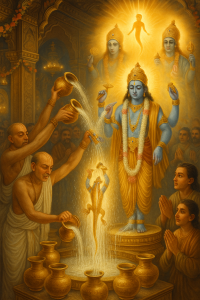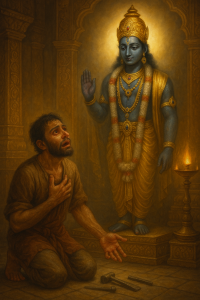The Notorious Thief
In a flourishing kingdom filled with wealth and festivity, there lived a thief known far and wide for his cunning and cruelty. He would slip into homes under the cover of darkness, plunder valuables, and vanish into the forest before anyone could raise an alarm. Despite his misdeeds, no one could catch him—so clever were his ways. Religion, morality, and remorse found no place in his heart. His only god was greed.
A Night of Festivities
One moonless night, the thief arrived at a village where a grand festival was being held in honor of Lord Viṣṇu. Every house was illuminated with ghee lamps. Sweet scents of sandalwood and incense filled the air. Devotees sang kīrtana, offered lamps, and brought gifts to the temple. Many homes were left empty as entire families attended the celebration.
The Intrusion
Seeing his opportunity, the thief crept into one such deserted home. There, in a corner, was a beautifully arranged altar of Lord Viṣṇu. The deity stood adorned with sandal paste, fresh tulasī leaves, flowers, and a glowing lamp. Offerings of fruits, sweets, and ornaments had been placed before the Lord.
Without reverence, the thief began collecting the valuable items. Gold, silverware, and fine clothes—all went into his bag. As he reached for the ornate silver lampstand beside the deity, his hand brushed against the flame. The lamp toppled and fell to the floor.
An Accidental Offering
Startled by the fall, the thief instinctively picked up the lamp and, without thinking, set it back before the deity. The flame flickered and rose again. In haste, he fled the house and disappeared into the night, carrying the stolen items.
Unbeknownst to him, in that brief moment—when he replaced the fallen lamp and rekindled its flame—he had unknowingly offered genuine worship to the Supreme Lord.
A Surprising Encounter After Death
Time passed, and the thief died, still immersed in a life that had been soaked in sin. But at the moment his soul departed the body, something extraordinary occurred. The celestial Viṣṇudūtas descended to collect his soul. At the same time, the Yamadūtas, servants of Yamarāja, also arrived to take him to the abode of punishment.
Seeing the sinful life he had led, the Yamadūtas confidently demanded his soul. But the Viṣṇudūtas stopped them, and a divine argument began.
The Lord Accepts Even a Moment’s Bhakti
The Viṣṇudūtas declared:
“Though this man’s life was full of wrongdoing, there was one moment when he unknowingly rendered sincere service to Lord Viṣṇu. When the lamp fell, he picked it up and placed it again before the deity, reviving the flame. That single act of spontaneous devotion, though unintentional, purified his heart.”
They continued,
“The Supreme Lord is bhāva-grahī—He accepts the essence of one’s intention. That flicker of service, like a spark in dry grass, burned away the sins of many lifetimes. No act of devotion is ever lost. The Lord has claimed this soul as His.”
Liberation and Eternal Service
Hearing this, the Yamadūtas fell silent. They could not counter the power of bhakti and the authority of the Lord’s servants. Bowing in submission, they departed.
The thief’s soul, now radiant and free from all contamination, was taken by the Viṣṇudūtas to the eternal world of Vaikuṇṭha. There, he was granted a spiritual body, untouched by past karma, and welcomed into the company of devotees to eternally serve the Lord he had unknowingly worshipped.
Lessons from the Story
- Even an accidental act of service to the Lord—like relighting a fallen lamp—has immense spiritual potency.
- The Lord does not judge by outer action alone but sees the heart’s connection, even if hidden beneath sin.
- Association with the deity, tulasī, lamp, and offerings purifies, regardless of one’s background.
- Bhakti is so merciful that even one unintended touch of it can grant liberation to the most fallen.


